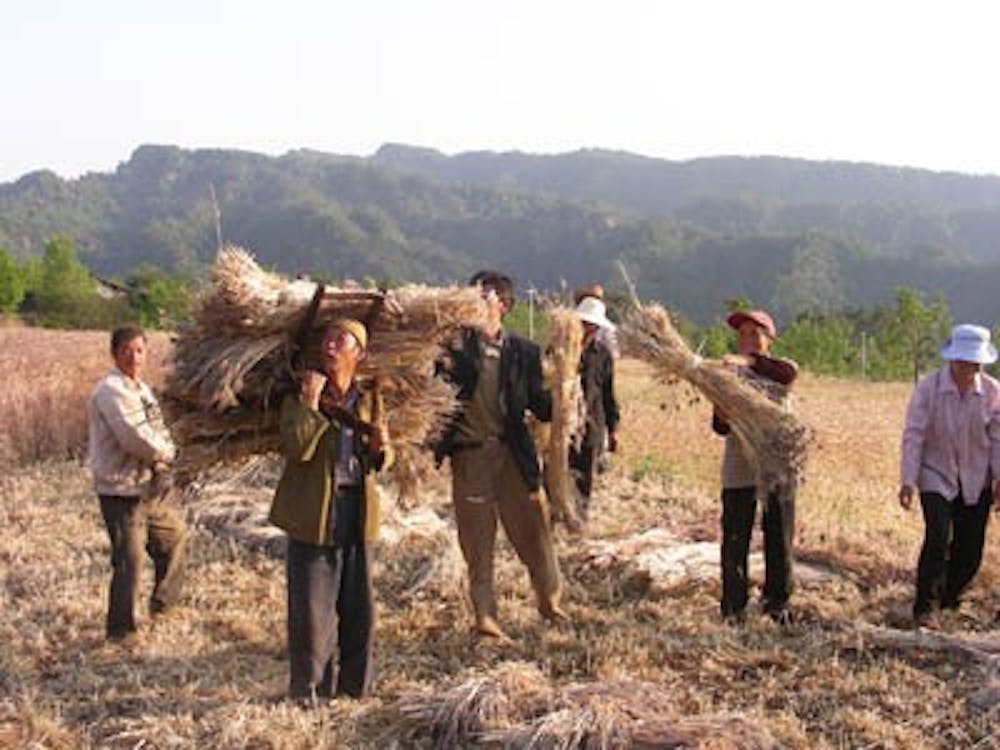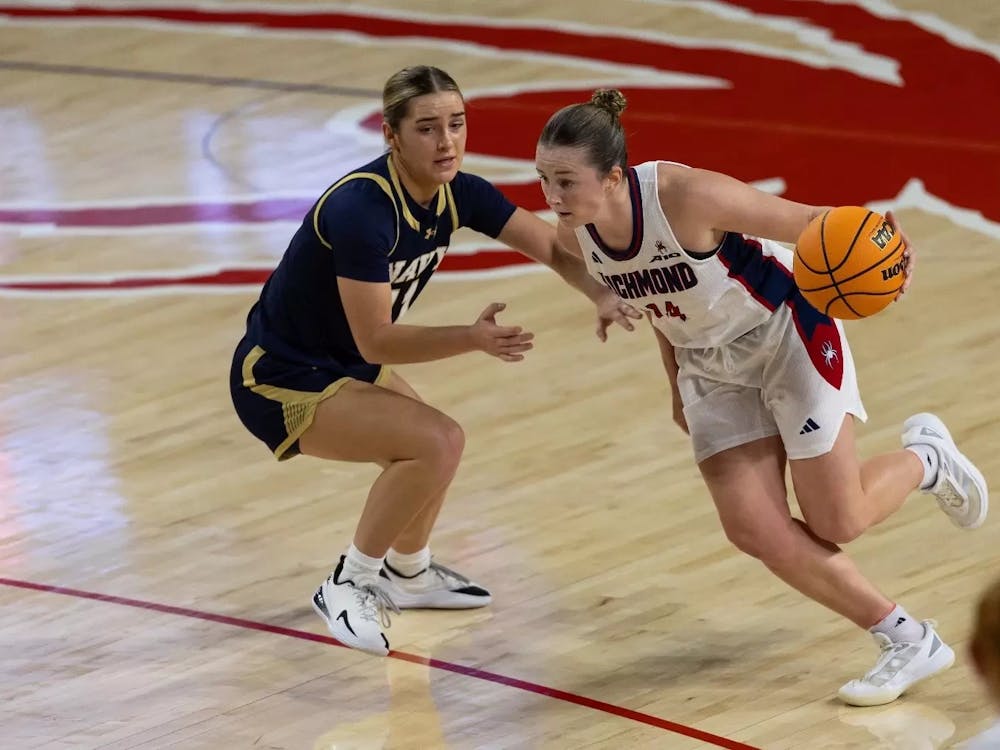If Garrett Graham had not run fast enough, his visa would have expired.
Graham had already stood for 25 hours in a crowded train from Nanjing to Shenzhen. The passengers, squatting to sleep on the train, endured foul conditions with locked train windows and no air conditioning.
When Graham got to Shenzhen, Chinese officials told him he couldn't renew his visa there. He slept on a bench for seven hours, waiting for the 25-hour train ride back to Nanjing. When he woke up, he barely made the train as its doors closed behind him.
Graham arrived in China in August 2007, just after completing his sophomore year at the University of Richmond. He lived with a Chinese family and spent three-and-a-half months learning Mandarin at Nanjing University.
Graham, who is a physics and math major, decided to take a gap year in the middle of his sophomore year after he saw a pattern that had emerged in high school continuing through college: being consistently overcommitted.
"I don't have time to think about what I'm doing," he had told his dad over the phone. His dad suggested he take the year off.
"I realized later he was joking," Graham said. "But I decided right then that was what I wanted to do."
He reached the "point of no return" when he told his track and cross country coach, Steve Taylor, that he would be leaving the University of Richmond, he said.
"I thought he had some great ideas," Taylor said.
"I certainly supported him in that decision."
Enjoy what you're reading?
Signup for our newsletter
Graham considered not returning to Richmond, never entering another classroom and never stepping on a track again, he said.
But now, "Running is one of the best parts about being back," he said.
"He looks different," said Jim Davis, his adviser and math professor, referring to the beard Graham has been growing for 11 months.
"It's just funny," Graham said about the beard. "It's just goofy. It's something I'm never going to be able to do in my life."
He started growing a beard when his brother and a friend came to visit him in China. They traveled the country together, and when he returned to where he was staying in Nanjing, he said his apartment was so cold that he decided to keep the beard for warmth.
After the cold holiday months, Graham left for Kunming to volunteer at Grace School, where he assisted in a seventh grade classroom and played basketball with the children. He also interned with the NGO Center for Biodiversity and Indigenous Knowledge (CBIK), where they paid him $95 to edit grant proposals in English.
The stipend covered his rent and living expenses for the full two-and-a-half months he spent in Kunming.
During a four-day stretch, Graham traveled with several of the organization's leaders to one of their project sites in a remote valley. They talked with village leaders about how their organization could meet the villages' needs.
CBIK had a microfinance project underway to help farmers buy new crops, livestock and equipment. The NGO was also funding training in new farming techniques -- an effort that aimed to yield higher numbers of crops.
The valley was a four-hour drive from any major city, another one-hour drive on a washed-out footpath from the nearest town and a 30-minute hike to the first village, he said. The villages had no modern plumbing and little electricity.
"They have problems on a scale that we really can't comprehend here," Graham said.
Graham was being tutored in Mandarin when he was in Kunming.
At first, Graham wasn't sure whether he would spend the whole year in China, but once he arrived, he realized how much time it would take for him to learn the language, he said. He thought Mandarin would be a useful language because China seemed to be the next rising power.
So his trip was not only a break from college, he said, but an investment. He first realized this when he traveled to China with Quest during spring break his sophomore year.
Graham was able to cut the costs of living in China in half by traveling on his own instead of studying abroad through the university. It was a better use of his academic scholarship to Richmond, he said, and he was able to use savings he had from high school and campus jobs.
While in China, Graham also wanted complete independence from the university, he said, which would allow him to take courses without having to check in with anyone at Richmond.
Taylor said Graham's trip to China was similar to the discipline of distance running, a sport that allows athletes to find out what their limits are and how to go beyond them.
"He got out of his comfort zone and challenged himself," Taylor said. "He can push beyond those barriers and the physical limitations."
Graham returned to Richmond because he decided he wanted to go to graduate school, he said. He was hooked into doing research after he spent summer 2007 researching topological dynamics at Cornell University, he said. During the spring, he will continue researching under an NSF grant awarded to Ovidiu Lipan, assistant professor of physics and mathematics.
"Mathematically, Garrett is every bit as clever," Davis said.
Before Graham left for China he asked Davis whether stopping math studies for a year would put a severe dent in his learning. There would be a lapse after taking the year off, Davis said, but Graham would catch up in a few months.
But, he said, "You will never in your life have the opportunity to do something like this again."
Davis would encourage other students to take similar gap years, he said, because college students were at a stage in their lives where they did not have many responsibilities.
"Being in a totally different culture just changes you as a person," Davis said. "You see your own culture in a new light."
Said Graham: "Taking the gap year was the best decision I ever made. But [Richmond] is where I'm supposed to be right now."
Graham has continued helping in classrooms by teaching high school geometry at Church Hill Academy in inner-city Richmond five days a week. The students come from high-risk areas of Richmond, where Graham said the public school was in lock down because of gang violence.
"[Teaching here] is one of the toughest things I've ever done," he said. "I always leave with the same dizzy feeling I feel after taking a long, hard final exam."
Taylor noticed Graham had changed when he returned to the United States.
"The thing I've noticed first of all is the appreciation," Taylor said. "I think the challenges of it were so great that he appreciates everything we have here."
Contact staff writer Kimberly Leonard at kimberly.leonard@richmond.edu
Support independent student media
You can make a tax-deductible donation by clicking the button below, which takes you to our secure PayPal account. The page is set up to receive contributions in whatever amount you designate. We look forward to using the money we raise to further our mission of providing honest and accurate information to students, faculty, staff, alumni and others in the general public.
Donate Now



